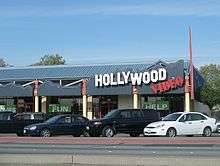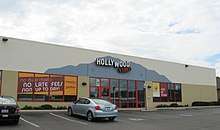Hollywood Video
Hollywood Entertainment Corp. (Nasdaq: HLYW),[1] more commonly known as Hollywood Video, was a home video and video game rental shop company started in 1988. The chain was the largest direct competitor to Blockbuster Video until it was purchased by Movie Gallery in 2005.[2]
 | |
| Hollywood Video | |
| Public | |
| Traded as | NASDAQ: HLYW |
| Industry | Retail |
| Fate | Chapter 7 bankruptcy Liquidation sale |
| Founded | 1988 |
| Defunct | 2010 |
| Headquarters | Wilsonville, Oregon |
| Products | VHS, DVD, Blu-ray, and video game rentals and sales |
| Parent | Movie Gallery |
| Subsidiaries | GameCrazy Hollywood Entertainment |
| Website | Official website |


Hollywood Video ceased operations in May 2010, when Movie Gallery, its parent company, declared Chapter 7 bankruptcy.[3] Its last US store closed on July 31, 2010, whereas the last official one in Canada closed on August 8 of that year.
In October 2011, the HollywoodVideo.com site had been relaunched as a blog. While the website remains active, the last entry was made in October 2014.
History
20th century
In 1984, Mark Wattles left college and was struggling financially. Wattles' parents had given him and his wife a VCR, which they used as a form of low-cost entertainment. Wattles later said: "I thought, 'There must be other people in America in the same shoes. I think this would be a great business." In 1985, Wattles borrowed money so he could open a 500 square-foot video rental store with 300 films, located in downtown Portland, Oregon. In 1988, Wattles formed Hollywood Entertainment and served as the company's president and chief executive. Hollywood Video stores later opened in Washington, California, Nevada, and Texas.[4]
In 1993, Hollywood, which operated 16 stores, became a public company.[5] As of 1994, the average Hollywood Video store was 7,500 square feet with 16,000 video tapes. In some instances, the company ordered up to 70 copies of a popular film for each store, while some stores stocked up to 200 copies of a single film. At that time, each store generated approximately $1 million, while 78 additional stores were planned to open in 1995.[4]
In January 1995,[6] Blockbuster filed a $10 million lawsuit against Hollywood Entertainment for hiring five former Blockbuster employees. Blockbuster alleged that the employees knew some of the company's trade secrets, which could be used to aid Hollywood Entertainment. At the time, Hollywood Video had 117 stores, compared to Blockbuster's 2,800 stores.[7] Hollywood Video was ranked fourth in national sales. In May 1995, a judge ruled in favor of Hollywood Entertainment, stating that Blockbuster had failed to demonstrate irreparable harm as a result of the hiring.[6]
In June 1995, Hollywood Entertainment had 153 stores in 11 states. The company's locations included stores operating under the Video Park and Video Central names. That month, Hollywood Entertainment announced plans to triple the number of stores by late 1997.[8] In August 1995, Hollywood Entertainment purchased the 42-store Video Watch chain in the mid-western United States for $59 million. Video Watch was the last of four video rental chains that had been targeted by Hollywood Entertainment for purchase.[9][10] In November 1995, Hollywood Entertainment announced plans to open 90 stores in Michigan over the next three years. The company also planned to open more than 200 stores in 1996.[10]
In 1996, Hollywood decided to establish three regional offices, with one each in the Chicago, Houston, and San Francisco Bay Areas.[5] Julie Wainwright became President and CEO of Reel.com, replacing founder, Stuart Skorman. After 27 months, in July 1998, CEO Mark Wattles announced Hollywood had purchased Reel.com "in a deal valued at $100 million",[11] which included $30 million in cash to Reel's stockholders; Reel.com was to continue operating independently, and led by its CEO Julie Wainwright,[12] then Wainwright then left the organization to be replaced by Jeff Jordan.
21st century
Hollywood Video was the target of a hostile takeover attempt, initially announced at the end of December 2004 by competitor Blockbuster Video. In February 2005, Blockbuster announced an exchange offer of $14.50 per share ($11.50 cash and $3.00 in Blockbuster shares). In response, Hollywood Video agreed to a buyout on Monday, January 10, 2005 by Movie Gallery, a smaller competitor. Movie Gallery paid $860 million, $13.25 per share, and the assumption of $380 million in debt. Stocks closed at $13.85 on January 10 after this news. Blockbuster then dropped its purchase plans, citing anti-trust concerns. Movie Gallery completed its purchase of Hollywood Video on April 27, 2005.
Hollywood became a subsidiary of Movie Gallery and maintained its Oregon headquarters.[13]
In December 2011, the website hollywoodvideo.com was relaunched as a movie news curator blog. The site used an automated "social scoring algorithm" to link to articles on the web pertaining to movies and other entertainment media content.[14] The site also contained a blog written by a single editor (that was later expanded to multiple editors) about current movie-related news. As of April 2013, the "social scoring algorithm" part of the site was removed and replaced with the blog.[15] The website also contained an interface for searching and buying movies from Amazon.com from within the Hollywood Video site.
Headquarters
At one time, Hollywood Video was headquartered in Beaverton, Oregon, in an 85,000-square-foot (7,900 m2) office building. In 1996, Hollywood moved its employees out of the building two years into its five-year lease. In 1996, Poorman-Douglas Corp agreed to occupy all of the space in the Beaverton building, relieving Hollywood of extra rent payments.[16]
After Hollywood decided to leave Beaverton, it signed a long-term lease for a 166,000 square feet (15,400 m2) building in Wilsonville, Oregon. Robert Goldfield of the Portland Business Journal said that Hollywood Video "barely" took occupancy of the structure; then Mark Wattles, the chief executive, decided to move the offices and the Hollywood Video headquarters to the former Smith's Home Furnishings headquarters in Wilsonville.[16] In 1996 170 full-time employees worked from the headquarters.[5] The 173,000 square feet (16,100 m2) headquarters facility was no longer occupied by October 1998; as of that month the space was for lease.[17]
In 1997, when Hollywood was considering a new headquarters location, the City of Wilsonville had signage codes that did not allow companies to use neon. The codes made Hollywood consider using other locations. Members of the City of Wilsonville's development review boards said that neon was out of character for the Wilsonville Business Park, Hollywood Video's prospective location.[18]
In January 1999, Trammell Crow Co. bought the 77 acres (31 ha) Thrifty Payless Inc. headquarters for $25.5 million and then broke the compound into sections, selling pieces of it for a total of $22 million; Trammell Crow retained control of the $8 million, 120,000-square-foot (11,000 m2) headquarters building. Hollywood leased the headquarters building,[19] and Hollywood remained headquartered in Wilsonville.[20]
References
- "Hollywood Entertainment Corporation Will Report First Quarter Results of Operations". Business Wire. April 13, 2004. Retrieved January 16, 2018.
- New York Times
- Spector, Mike; Lattman, Peter (May 3, 2010). "Hollywood Video Closes Doors". Wall Street Journal. Retrieved 2012-03-30.
- "Hollywood Video hits big time". The Associated Press. December 16, 1994. Retrieved February 23, 2017.
- Rose, Michael. "Hollywood Video expansion includes three regional offices." Portland Business Journal. Sunday June 23, 1996. Retrieved on September 26, 2010.
- "Judge rules in favor of Portland video chain". Statesman Journal. May 3, 1995. Retrieved February 23, 2017.
- "Blockbuster sues rival company". Tallahassee Democrat. February 4, 1995. Retrieved February 23, 2017.
- "Expansion plan boosts stock for Hollywood". Statesman Journal. June 23, 1995. Retrieved February 23, 2017.
- "Hollywood Video will buy 42 stores". Statesman Journal. August 2, 1995. Retrieved February 23, 2017.
- "Hollywood Video expanding in state". Battle Creek Enquirer. November 22, 1995. Retrieved February 23, 2017.
- "Hollywood Entertainment to Buy Reel.Com". Retrieved 2018-10-01.
- Pelline, Jeff (July 31, 1998). "Reel.com goes Hollywood". CNET News. Archived from the original on 2000-01-21.
- "Movie Gallery completes Hollywood acquisition." Portland Business Journal. Thursday April 28, 2005. Retrieved on September 26, 2010.
- "About The New Hollywood Video". The NEW Hollywood Video. Retrieved 2015-12-28.
- "The NEW Hollywood Video - An Entertainment News Curator". 2013-04-07. Archived from the original on April 7, 2013. Retrieved 2015-12-28.
- Goldfield, Robert. "Poorman-Douglas swallows up Hollywood's Beaverton space." Portland Business Journal. Sunday October 6, 1996. Retrieved on September 26, 2010.
- Miller, Brian K. "Listed industrial space in area is now plentiful." Portland Business Journal. Friday October 16, 1998. Retrieved on September 26, 2010.
- Binole, Gina. "Hollywood sign imbroglio: No neon, no headquarters." Portland Business Journal. Friday August 29, 1997. Retrieved on September 26, 2010.
- Miller, Brian. "There was never a dull moment in real estate." Portland Business Journal. Friday January 1, 1999. 1. Retrieved on September 26, 2010.
- "Contact Us." Hollywood Video. June 11, 2004. Retrieved on September 25, 2010. "Hollywood Entertainment Corporation 9275 SW Peyton Lane Wilsonville, OR 97070."
External links
![]()